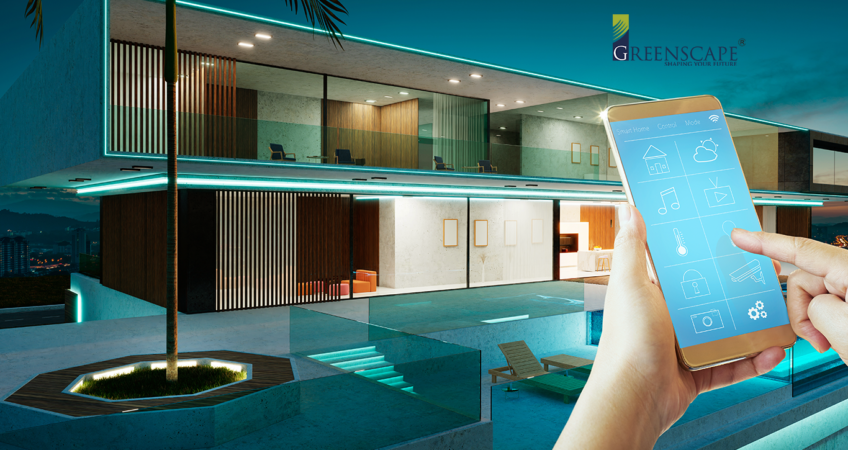How to Create a Smart Home: An Overview Of The Latest Trends And Technologies!

A smart home is a residence equipped with advanced technologies that enable automation, remote control, and intelligent management of various home functions. These functions can include lighting, heating and cooling systems, security systems, entertainment systems, appliances, and more.
Smart homes are having a significant impact on the Indian real estate sector. Homebuyers today are increasingly seeking properties that offer smart features and automation. These smart homes provide convenience, comfort, and enhanced security, making them highly desirable.
EMERGENCE OF SMART HOME
The concept of a smart home emerged as a result of the rapid development of technology, particularly in the areas of wireless communication, sensing capabilities, and the internet. The idea behind a smart home is to create a connected ecosystem where devices can communicate with each other and with the homeowner, providing increased convenience, energy efficiency, and security.
The origins of smart homes can be traced back to the early 20th century when electrical appliances began to be introduced into households. However, it was in the late 20th century and early 21st century that the concept gained significant traction and started to become more accessible to consumers. The proliferation of the internet and the rise of smartphones played a crucial role in the emergence of smart homes. These technologies provided the foundation for connectivity and remote control, allowing homeowners to interact with their devices from anywhere. The development of wireless communication protocols, such as Wi-Fi and Bluetooth, further accelerated the growth of smart homes. These protocols enabled devices to communicate and exchange data without the need for complex wiring or dedicated networks.
In recent years, the increasing popularity and advancements in voice-controlled virtual assistants, like Amazon Alexa, Google Assistant, and Apple Siri, have greatly enhanced the user experience in smart homes. Voice commands have become a common and intuitive way to control and interact with smart devices, further simplifying the automation and management of various functions. Today, smart homes continue to evolve with the integration of emerging technologies such as artificial intelligence, machine learning, and the Internet of Things (IoT). These advancements enable greater automation, personalization, and energy efficiency, making smart homes an integral part of the modern lifestyle.
SMART HOME TECHNOLOGIES IN MODERN WORLD
Creating a smart home involves integrating various technologies and devices to enhance the automation, convenience, and efficiency of your living space. Here’s an overview of the latest trends and technologies you can consider when setting up a smart home:
- Voice Control: Voice assistants like Amazon Alexa, Google Assistant, or Apple Siri are popular for controlling smart devices. They allow you to use voice commands to control lighting, thermostats, entertainment systems, and more.
- Smart Lighting: Replace traditional bulbs with smart bulbs that can be controlled remotely or via voice commands. You can adjust the color, brightness, and schedule lighting scenes to suit your preferences or create ambiance.
- Home Security Systems: Install smart security cameras, door/window sensors, and smart locks. These can be monitored and controlled remotely using a smartphone app, providing real-time notifications and allowing you to monitor your home from anywhere.
- Energy Management: Use smart thermostats to regulate heating and cooling based on your preferences and occupancy. They can learn your habits and adjust temperature settings accordingly, saving energy and reducing utility bills.
- Entertainment Systems: Set up smart TVs, streaming devices, and sound systems that can be integrated with voice assistants. You can control your entertainment devices, stream content, and create immersive home theater experiences.
- Smart Appliances: Upgrade your kitchen with smart appliances such as refrigerators, ovens, or coffee makers. These can be controlled remotely, offer energy-saving features, and even suggest recipes based on available ingredients.
- Home Automation Hubs: Consider a central hub or smart home automation system that acts as a control center for all your devices. It allows you to manage and automate various functions, integrate different technologies, and create custom routines.
- Internet of Things (IoT) Connectivity: The IoT enables devices to communicate with each other and exchange data. Ensure that your smart devices support wireless connectivity protocols like Wi-Fi, Bluetooth, or Zigbee for seamless integration and control.
- Environmental Monitoring: Install smart sensors to monitor air quality, humidity, and detect leaks or smoke. These sensors can send alerts to your smartphone and help prevent potential hazards or maintain optimal living conditions.
- Integration and Compatibility: Check compatibility and integration options when selecting smart devices. Look for devices that support popular smart home platforms like Amazon Alexa, Google Assistant, or Apple HomeKit, ensuring easy interoperability.
- Data Security: Protect your smart home network by using strong passwords, enabling two-factor authentication, and keeping your devices’ firmware up to date. Consider network segmentation to separate smart devices from critical personal data.
- Customization and Personalization: Explore apps and software that allow you to create custom routines, scenes, and automations based on your daily routines, preferences, and specific needs.
The advent of smart homes is transforming the Indian real estate sector. With their emphasis on convenience, comfort, and security, smart homes are in high demand among homebuyers. Real estate developers are responding to this demand by integrating smart features into their projects, offering added value and differentiation. The concept of smart cities further fuels the adoption of smart homes, aligning with the government’s vision of sustainable and connected living. While challenges such as affordability and awareness remain, the growing accessibility of technology and increasing consumer demand indicate a promising future for smart homes in the Indian real estate market. As these modern, connected living environments continue to evolve, they are poised to shape and redefine the Indian real estate landscape for years to come.



